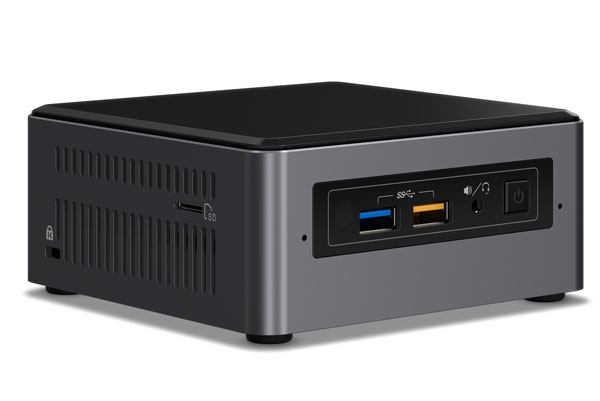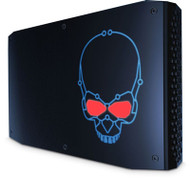Mini PC or Laptop: The Pros and Cons
May 7, 2019
If you want a computer without the bulky tower form of a full-sized PC, then you need to decide between a laptop vs. a mini PC to fulfill your computing needs. Both offer plenty of power in a smaller package, but there are some significant differences that--depending on their application--make one superior to the other for your business needs. Comparing the current generation of Intel NUCs vs. laptop solutions shows an even sharper contrast, especially for end users looking for industrial or business computing options.
What Is a Laptop?
It may seem like a no-brainer, but that’s largely due to the marketing behind consumer electronics today, as there are quite a few non-laptop “laptops” on the market. For the purposes of this discussion, we’re talking about traditional laptops vs. mini PC computers. Tablets have advanced to the point where they are heavily encroaching into the world of laptops, with available keyboards and ever-increasing specs thanks to the popularity of 2-in-1 systems. We’re going to exclude these platforms that are based on largely mobile technology as they lack the same fundamental power, hardware configurations, and connection options that are shared by desktops, mini PCs, and true laptop computers.
What Is a NUC?
Intel’s Next Unit of Computing, or NUC for short is a small form factor computer, which is sometimes referred to as a mini PC. Designed to give big computing performance in a small package, these powerhouses come in various configurations, all using state-of-the-art chipsets and reliable components. The result is serious computing power packed into a unit the size of a small shoebox. This combination of size and strength makes them popular among industrial and commercial enterprises, though more and more consumers are deciding that smaller is better for their computing needs.

Defining Your Needs
The first step in deciding whether you should get a mini PC vs a laptop is determining your needs. Establish not just the technical specifications, such as processor and RAM, but also the expected pattern of usage by the machine’s operator. Defining these areas will help ensure you make the right decision about an Intel NUC vs. laptop computers.
Portability - Both mini PCs and laptops offer you the freedom to take your computer wherever you need it, although in different ways. Laptops offer an all in one travel solution. Fold your keyboard and screen together, one of which sets above the housing for your computing components, and you’re ready to move, often with a battery for working on the go. Mini PCs like the NUC don't include a screen and keyboard, rather you unplug your box, and it’s ready for travel, where it can be reconnected to a monitor or television and other input devices.
When evaluating a laptop vs. a mini PC in this category, it comes down to how you need your portability. If you need to be ready to work whether you’re near a base station or not, a laptop may be the best choice, although lightweight travel monitors, keyboards, and power packs could bridge the gap for a NUC. If you want a smaller package to carry between home and office, then a mini PC offers the smaller size that makes it ideal.
Peripheral Necessity - Powerful computers are needed increasingly for commercial and industrial automation applications. When there isn’t room for a tower, a laptop or mini PC can be a perfect choice. For industry, a mini PC vs. a laptop is often a better choice. NUCs can be integrated into modern equipment in a range of roles, from simple monitoring of data to semi-autonomous control systems. Rather than a standard keyboard and monitor, these systems often feed data back to a central system or remote operator locally to a system specific control apparatus.
Meanwhile, both laptops and mini PCs prove proper in commercial and office settings where either a notebook-style computer or small desktop unit and accessories can perform the necessary functions. In these roles, NUCs can prove a popular choice for cloud and virtual applications, meanwhile, laptops could still be the best choice for executives who need to get work done during their commute.
Adaptability - While the all-in-one-unit aspect of the laptop can be attractive for some uses, it also sets hardware limits for the system. The NUC supports a more “modular” experience that lets you change devices at will. This lets you switch or upgrade monitors, input devices, and attached systems on a mini PC vs. a laptop that is limited to the built-in monitor and keyboard and the user experience they’re capable of.
Power - The performance gap between laptops and towers has narrowed over the years, though the larger real-estate space in a tower PC still allows for more performance components in powerful gaming models, however, for the more modest requirements that make up the bulk of users’ needs in industrial and commercial settings, laptops are just as well-suited as their less-mobile, similarly appointed counterparts. The same is true for mini PCs. In fact, Intel NUCs vs. Laptops from major manufacturers show a lot of similarities because so many space-saving features rely on the technology used in the best laptops.
From lightning-fast Intel Core processors and solid-state storage to effective heat dissipation, NUCs and laptops match up well. This also helps keep prices for similarly appointed systems fairly close. In addition, the power comparison between a mini PC vs a laptop tends to fall to the features on the models you’re comparing. If you find that a given laptop’s specs are a better fit, a wide range of mini PC variations exist that allow for apples to apples decision.
Customized Experience
If you aren’t sure whether or not a NUC will fit your needs, EWC Technologies can help. Fill out our contact form, and one of our experts will contact you to discuss your particular computing needs and help you identify where an Intel NUC can fit into your tech strategy. From smart machines to in-vehicle computers and better office systems, there’s a NUC that can help your company thrive. In some cases, a demo can even be arranged to let you try out the advantages of a NUC before you buy.


